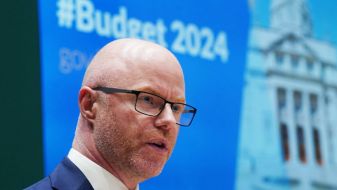The budget offered some good news for students, but there remains a lot of left to be done, a representative said.
Dean Kenny, who is president of the students’ union at the University of Galway, welcomed an extension of tuition fee reductions for a further year.
However, he said Budget 2024 did not adequately address the biggest issue facing students – a lack of suitable accommodation.
He claimed students were too often viewed as an afterthought, with little focus on resolving issues affecting them.
The budget will see the temporary €1,000 reduction to the €3,000 student contribution to fees extended for a further year.
Students whose households have a joint income below €100,000 can apply for a grant through SUSI (Student Universal Support Ireland) to secure a further €500 euro fee reduction.
“The fee reduction is welcome, but it’s a once-off and there’s no guarantee it’s going to stay,” said Mr Kenny.
He said many young people are relinquishing their dream of a degree and dropping out of their courses because they cannot find somewhere suitable to live.
Mr Kenny said he was aware of one student who commutes seven hours a day to attend classes after being unable to secure a bed.
Ahead of the budget, University Students Ireland (USI) called on the Government to create 30,000 new student beds.
“There was little to no mention of accommodation,” Mr Kenny said of Tuesday’s spending plan announcement.
“We called for 30,000 additional student beds and for government to step in with third level institutions to ensure those are built. No mention, no funding ringfenced, nothing.
“We welcome any cut in fees, but our real issue with accommodation hasn’t been met, hasn’t been taken seriously.”
He added: “The number one issue for students is accommodation or lack thereof.
“And the supply that’s there to a large extent is unsuitable, too expensive. Students are in digs, they’re not close to the campus. People are commuting long hours, long distances. People driving up to seven hours a day. It’s ridiculous. I didn’t realise how bad it was until I got this job. I was kind of thinking it’s bad, but it’s very bad.
“There needs to be a strategy put in place where government works with our third level institutions to create more affordable student accommodation because we haven’t seen that.
“We’re seeing more and more students, more and more people who go to third level education in this century, in this decade than ever before.
“It’s a lot more accepted, it’s a lot more commonplace, but we’re not seeing that being reflected in the numbers of purpose-built student accommodation beds”.
Mr Kenny, who is 23 and from the village of Belcarra in Co Mayo, said students were being encouraged by the Government to avail of accommodation being offered by people who have signed up to the scheme that allows them to earn €14,000 tax free for letting a room in their home.
But he claimed students who did that were being left exposed because they did not have full tenancy rights.
“It’s a temporary fix to a larger problem,” he said.
“Students are being advised to go to digs, but we have no guarantee that they’ll be looked after in digs and that their rights are protected and for a large amount of people they’re not.
“They have no access to kitchen facilities, they are kicked out on a Friday for the AirBnB guests at the weekend and then allowed back in on a Sunday. There are no guarantees of a tenancy contract, no guarantee of the deposit being returned. Rents are constantly being increased.
“There’s no protection for them, they’re not even recognised as a tenant. There’s nothing there for them.”
The budget included a measure to allow parents who pay for their student children to have tenancies in “rent a room” accommodation to claim the rent tax credit – a credit that has increased to €750.
Mr Kenny said the detail of that scheme need to be clarified and said there were questions on how it would be rolled out.
The students’ union leader, who recently graduated as a secondary school maths teacher, said there needed to be a permanent reduction to the €3,000 contribution to tuition fees.
He said there was also a need to widen access grants through SUSI.
“We advertise ourselves as having free education, and then we charge €3,000 to attend university,” he said.
Referencing the numbers of students deciding to drop out of courses, Mr Kenny warned: “Some of them give up their hope of attending university because they can’t get a place to live. So everyone knows how bad it is. But I think no one really, at the top level, seems to seriously want to look at changing it.
“It seems like we’re an afterthought most of the time. And we’re the people that are going to university to get education, primarily to better ourselves to be able to contribute to society, to be able to pay our taxes, to be able to build a home, to be able to build a life, to be able to have a career, and then we’re not supported in that education.
“So it does feel like we’re an afterthought.”







